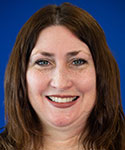Green and Red Lights for Career Success
By Kathleen Hoffelder, NJCPA Senior Content Editor –
September 22, 2023

Finding a mentor, selecting a career path and passing the CPA Exam are just some of the opportunities and challenges facing the bright young professionals filling the hallways of accounting practices and organizations today. During a panel presentation at the NJCPA Convention & Expo in June, emerging leaders discussed what they consider “green lights” for success and what they labelled “red lights” or issues to overcome.
Green Lights
Some great chances for learning often go unnoticed or are underappreciated in organizations today, which is why Joseph Hunt, CPA, PSA, assurance manager at CliftonLarsonAllen and moderator of the panel, said it’s important to know how to “shadow” other professionals to get a leg up on learning. Young professionals, he said, need to ask for those opportunities even if they are not readily available. “It makes a big difference, and it helps bridge the generational gap.”
Panelist Lexi B. Wilson, CPA, manager at Bowman & Company LLP, added that working with other generations increases those learning opportunities as well as enhances the culture in the office. “At the end of the day, we all have to work out a way to work together,” she said, noting that the younger generations “need to step up.” While Baby Boomers are already many of the mentors, she added that younger professionals need to make themselves heard, and similarly, Baby Boomers need to listen to new ideas presented.
To Matthew Mojica, CPA, financial reporting specialist at Prudential and panelist at the session, forming good relationships with coworkers and managers helps to “not let the generational divide cause separation.” He suggests understanding what’s important to each group is key to getting along. For example, he added, young professionals are in favor of standing desks and flex time.
As Hunt reminds, “everyone wants to have a purpose.” He said it’s important to know the “whys” of doing things in the office, and older professionals need to be aware that younger generations will be asking lots of questions.
Indeed, young accountants today value articulating the firm’s strategy from the top of the organization down to first-line staff on a consistent basis so that everyone can see how their role contributes to the overall strategy, according to a November 2022 Thomson Reuters survey.
Learning, however, is also a two-way street, particularly among different generations. According to panelist Jenna Sanfilippo, CPA, MSA, a senior tax accountant at WilkinGuttenplan, younger professionals can still be mentors, even early on in their careers. She said it can be comforting to hear, “I just learned it this month.” This way, a manager “goes down to their level” to show how they can relate.
Red and Yellow Lights
From overcoming confidence issues to passing the CPA Exam, emerging leaders in the accounting profession have a lot of red or amber lights to attempt to slow them down, but panelists were quick to find ways around them.
Decidedly, one of the toughest hurdles or “red lights” to get past is studying for the CPA Exam while working 40-, 50- or 60-hour workweeks. Hunt recommended employees inform their managers about study times to lock it in on their schedules — this helps both the manager in scheduling projects and the employee in sticking to their study routine.
Wilson maintained that simple red-light situations can also be easily turned into green-light opportunities if workers are not afraid to ask when they don’t know something. It’s also important to show initiative on the job, she said. Even if a manager’s first response is “no,” it could be a “yes” later on.
Finding and seizing those learning opportunities can make or break a career. After all, Mojica noted that there’s so much learning that occurs on the job. “We’re the magicians of the business world.”
 | Kathleen HoffelderKathleen Hoffelder is the senior content editor at the New Jersey Society of CPAs. More content by Kathleen Hoffelder: |
The information in this guide has been gathered from many sources, including the Internal Revenue Service, the Social Security Administration, state agencies, professional organizations and members of the NJCPA. The majority of state agencies offer online and prerecorded services. It’s best to check online or call before you visit.
Material contained within this guide should be augmented by, and used in accordance with, a certified public accountant's professional judgment. Your CPA can properly apply the tax laws and regulations to the facts and circumstances of your particular situation. For help with locating a CPA, visit findacpa.org.
The New Jersey Society of Certified Public Accountants is not responsible for any claims arising as a result of this information or its usage.
This guide was updated in August 2024. Future users of this material are cautioned that some portions, particularly tax-related information, may become outdated.